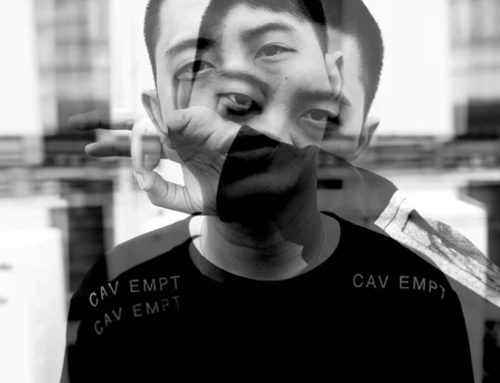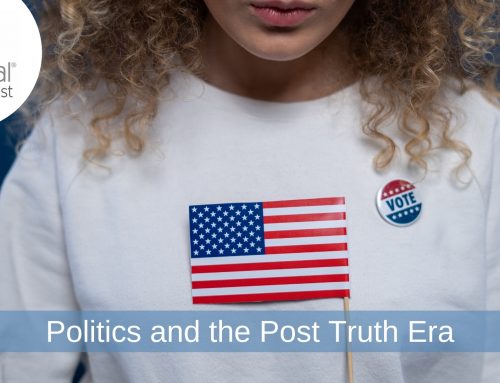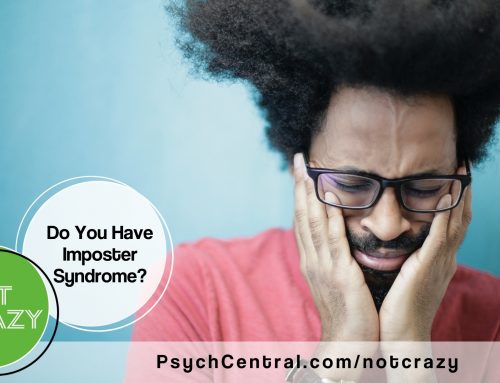Got the quarantine blues? Meet Woebot, an on-demand therapy robot who talks you through your problems! Woebot’s advice is based on cognitive-behavioral therapy and can help you identify distorted thinking. He even checks in on you to see if you’re OK. In today’s podcast, we talk with Woebot’s creator, Dr. Alison Darcy, who shares how this phone app came to be and how it works. Click on the player below to listen now!
SUBSCRIBE & REVIEW
Guest information for ‘Woebot Mental Health App’ Podcast Episode

Dr. Alison Darcy is Founder and President of Woebot Labs, Inc. Prior to Woebot, Alison was a Clinical Research Psychologist and adjunct Faculty in Psychiatry and Behavioral Sciences at Stanford School of Medicine. A specialist in digital treatment development, she has developed health technology for 15 years.
Computer Generated Transcript for ‘Woebot Mental Health App’ Episode
Editor’s Note: Please be mindful that this transcript has been computer generated and therefore may contain inaccuracies and grammar errors. Thank you.
Announcer: You’re listening to the Psych Central Podcast, where guest experts in the field of psychology and mental health share thought-provoking information using plain, everyday language. Here’s your host, Gabe Howard.
Gabe Howard: Welcome, everyone, to this week’s episode of the Psych Central Podcast. Calling into the show today we have Dr. Alison Darcy, who is the founder and president of Woebot Labs Incorporated. Prior to Woebot, Alison was a clinical research psychologist and adjunct faculty in psychiatry and behavioral sciences at Stanford School of Medicine. A specialist in digital treatment development, she has developed health technology for over 15 years. Alison, welcome to the show.
Alison Darcy, PhD: Thank you very much for having me.
Gabe Howard: Well, I am very excited to talk about Woebot. On your LinkedIn, this caught my eye. It says that you made a robot that makes people feel happier. Can you explain what that means?
Alison Darcy, PhD: Sure. Well, the robot is Woebot. It’s more like a robot character. Woebot really serves as a guide in what is fundamentally a self-directed emotional support program based on cognitive behavioral therapy. So the robot really is not a physical robot. It’s the robot character. That really came from, I think, our origins of making games. Initially we were making cognitive behavioral therapy themed games. And so when Woebot was “born,” he just kind of came out of the gate with a personality and a backstory. And that piece of it was a lot of fun.
Gabe Howard: So Woebot is an app,
Alison Darcy, PhD: That is correct.
Gabe Howard: It’s free, it’s available to download on Apple iTunes and Google Play stores, I’m assuming that they just search for Woebot.
Alison Darcy, PhD: Correct. Yes.
Gabe Howard: But, what’s it like? I mean, so they’ve downloaded the app, how do users interact with it and how do they use it? I guess what I’m really driving at is, you’ve got an app that sounds like it’s sort of doing therapy, but there’s not a person on the other end of it. So it’s just a very curious thing.
Alison Darcy, PhD: You know, it’s actually not as curious as it might sound. So there’s been a lot of apps that have created experiences that are aimed to help people with depression and anxiety. Right? Through cognitive behavioral therapy and in particular that approach is used a lot because it’s quite formulaic. Right? So it lends itself well to development in a digital kind of app based format. And so we have all of the elements there that you would expect to find in one of those programs, such as mood monitoring. Right? So basic checking in every day. How are you doing? What’s going on with your mood? And mood tracking, and there’s also the practice of skills, which in cognitive behavioral therapy or CBT, as it’s known, involves challenging your thinking in situations where you’re having intense emotional experience about something, you know, either negative or anxious. And the more you challenge your thinking in those situations, the better you end up doing after all. So you’re sort of fighting against those negative automatic thoughts or the inner critic kind of experience that, you know, those of us who have intense emotional experiences will be familiar with. And so there’s a practicing skills piece and there’s other skills in there like mindfulness and behavioral experiments, which is just a fancy name for saying like doing things as an observer and doing things differently and experimenting. And then there’s also, you know, a lot of cognitive behavioral therapy has a lot of learning in it as well, there’s a lot of concepts that are not necessarily familiar. Woebot delivers all three of those things, but just through a conversation. So the experience is like literally a conversation with this friendly, quirky but warm robot character.
Gabe Howard: I don’t want to sound negative. So please don’t hear it that. It is curiosity, because my first reaction to hearing about Woebot is that it’s a chat bot. A chap bot can’t replace therapy, right? It can’t replace a therapist.
Alison Darcy, PhD: Mm-hmm.
Gabe Howard: I guess my question is, how do you feel that works? I just I’m sort of struggling with it, especially, you know, in the age of the Internet, when bots are and I’m making air
Alison Darcy, PhD: Yeah.
Gabe Howard: Quotes, bots are often seen as like trolls and negative. And they’re looking for keywords to sell you advertising.
Alison Darcy, PhD: Yeah.
Gabe Howard: And now here we are. And you’re like, no, no, no, my bot is warm and friendly and a robot character. And that’s kind of where I am. And like, can you explain that?
Alison Darcy, PhD: Yeah, I totally agree with you, by the way. I mean, nobody’s ever going to replace therapy and nobody ever should. I think some people mistake things like Woebot as trying to replace therapy because the experience is delivered in a conversation. And when it’s just a conversation, it appears like, oh my God, this thing is trying to be a therapist. Right. But actually, it’s just a simpler way to kind of go about your day. We know that it’s good to kind of talk about things. Right. And get things off your chest when you’re in a difficult space. The apps that have come before Woebot were effectively asking people to kind of swipe through their problems, right? And click and engage in certain things. And it’s just not as easy as a conversation. And I think especially when you’re feeling low, I mean, I don’t know about you, but it’s my brain does not work as well. You know, it is just harder to navigate through complex things. And, yes. So a conversation is just a simplifying kind of way to go about getting information and practicing skills. And so I think about conversational like I think about chat bots as an interface. And our chat bot in particular is mostly scripted. And so what you’ll find is this conversational experience, but it’s not a true A.I. in that it is, you know, making things up as it goes along, for example, or not like the movie Her. You know, I think you’ll find the experience
Gabe Howard: Right.
Alison Darcy, PhD: It’s just a lot more scripted. In fact, I think what people underestimate, like the amount of design that goes into crafting the things that Woebot says. It’s actually closer to, like a beautifully written choose your own adventure or self-help book, then it is a dystopian. Woebot is a robot character very intentionally because I think that was the one thing that we didn’t want people to mistake it for something that’s like human or pretending to be human. It is very clearly a fiction in terms of Woebot’s character. And so that people are really clear that there is no person behind this, because I think that’s part of what makes Woebot valuable as well, is that it’s you know, it’s just a chat bot. So it can see you on your worst day. You know, you can actually literally say anything to Woebot. And he very clearly does not understand or he’s not going to be offended. There is no person there. There’s no emotion there. And the experience is so much more mundane and friendly and warm and occasionally funny as well, because I do think humor is important.
Gabe Howard: How did you come up with the name of Woebot?
Alison Darcy, PhD: The name was pretty tongue in cheek, right? So it’s obviously woe, you tell it your woes. I recently find very early sketches of something from 2015. And I had sketched this cartoon character and I had said Mr. Woebot, and I just thought it was funny. But then I actually went on to I had a conversation with a subreddits moderator from the depression subreddits. And I kind of wanted to put feelers out there. And I was like listen, how do you think about this name? And actually, he said, listen, I love it. I think it’s hilarious. I am so tired of all those apps for depression that are like these like super happy names. And he’s like, have you ever met somebody with depression? Like, I think this is much funnier. So it is supposed to be a little tongue in cheek. The problem with it is that non-native English speakers just have no idea about the pun so.
Gabe Howard: That makes sense.
Alison Darcy, PhD: Well, what are you going to do?
Gabe Howard: Yeah. You know, I think it’s interesting that you pointed out that, you know, people who live with depression, you know, I live with bipolar disorder. So depression is obviously a big part of that. I get so frustrated is probably the right word that everything designed to help me always has these like touchy feely, flowery, huggy names. And I’m like, I don’t relate
Alison Darcy, PhD: Right.
Gabe Howard: To any of this now. You know, your logo is sunshine and flowers. And I don’t relate to that. And they’re like, oh, you want my logo to be like a storm with somebody soaking wet? And I’m like, no, no, that wouldn’t be cool either.
Alison Darcy, PhD: Not either. Yeah, right. Right.
Gabe Howard: It sort of reminds me of like a therapy version of, say, Amazon.com’s chat, customer service. When you first go into Amazon’s customer service, little chat thing, it tells you that it’s not a person and you type in what problem you’re having and it gives you some choices and it asks you if any of those are right. And then eventually, if the automated system can’t guide you to the right place, it asks you if you want to chat with an associate. Now, to be clear, Woebot never gets to the point where it can recommend or send you to an associate. It’s 100 percent virtual for lack of a better term, but it sounds like it’s based on the same technology, right? It looks for keywords and it gives you ideas. And it’s. Is that like a very simplistic way to describe it?
Alison Darcy, PhD: That’s exactly right. Like instead of you selecting something from a menu, it just allows you to describe what’s going on in natural language and then it understands. OK. It’s sort of like, so, you know, your boss is an idiot. Is this a relationship problem that we’re dealing with? And that’s the kind of interaction that Woebot will have. So it’s asking you, it’s sort of like this is how I’m understanding what you’re saying. Is that true? And if that is true, OK, here are some ways that we can go about this. And if you want if indeed you want my help with this or maybe you just want to tell me what an idiot your boss is. And that’s OK as well. And literally that is how the conversation goes. This is a sort of a way of interacting with technology that feels a lot more natural to us. When you need help, right, you just want to be able to say what’s going on and say it really simply. And then and be understood and be heard. Woebot is not pretending to be more intelligent, I think, than he actually is. And that’s really important for us as well. It is important that like he clearly outlines the barriers and the limitations of understanding. But I’ve always had this theory that a really good cognitive behavioral therapist in particular should not become like part of your process.
Alison Darcy, PhD: Right. I always felt like there isn’t any particular magic there per se. We just one of the beautiful things about CBT that I love is that it’s actually so empowering as an approach because it’s saying like you have the skills to figure this out. I’m just going to ask you the right question. And I think that’s the magic about Woebot. Woebot is going to ask you the right questions. But ultimately, it’s you who has to do the work still. Right? Like you still have to be sharing what the negative automatic thoughts are. You still have to see if there are distortions in those parts. And then you are the one that’s still going to have to do the work of reframing those thoughts and writing them down and writing them out. But so Woebot is a guide that facilitates that process. But the beautiful thing is it’s really clear. It’s still on you. Right? And I think that’s a much more empowering than this kind of I have all of the answers and I will diagnose you or I will treat you quote-unquote treat you right like this is very clearly a self-directed program.
Gabe Howard: Well, that’s really cool, one of the things that you keep saying is that you say to Woebot. You tell Woebot. Is this something that you have to type in or can you literally talk to Woebot?
Alison Darcy, PhD: Right now, no, it is just typing, it’s typing and there’s a reason for that, too. I mean, we often get asked why and there’s a couple of reasons why we haven’t made a voice version of Woebot. One is it’s just more complex and there are privacy things about a voice booming out of a space that you can’t control. Right. But mostly you’ll see this even in a therapist’s office when you’re doing CBT. Often you are writing things down on a piece of paper and there’s a reason for that. Writing down your negative thoughts is a process that we call externalization. You’re literally getting it out of your head and when you see that part written down. Looking back at you, it’s kind of shocking. It’s like, oh, wow, that’s in my head. That’s really interesting. And so there’s value in that process of externalization, which is really just getting it done and seeing that part in front of you. And because once it’s out of your head, then you can do something with it and you can actually challenge it. You know, it becomes external and it becomes something that you can challenge in a way that ultimately can help you feel better when you realize, wow, I’ve been walking around with this assumption all the time and it’s actually not 100 percent true.
Gabe Howard: We’ll be right back after these messages from our sponsors.
Sponsor Message: Hey folks, Gabe here. I host another podcast for Psych Central. It’s called Not Crazy. He hosts Not Crazy with me, Jackie Zimmerman, and it is all about navigating our lives with mental illness and mental health concerns. Listen now at Psych Central.com/NotCrazy or on your favorite podcast player.
Sponsor Message: This episode is sponsored by BetterHelp.com. Secure, convenient, and affordable online counseling. Our counselors are licensed, accredited professionals. Anything you share is confidential. Schedule secure video or phone sessions, plus chat and text with your therapist whenever you feel it’s needed. A month of online therapy often costs less than a single traditional face to face session. Go to BetterHelp.com/PsychCentral and experience seven days of free therapy to see if online counseling is right for you. BetterHelp.com/PsychCentral.
Gabe Howard: We’re back discussing the mental health app Woebot with Dr. Alison Darcy. Let’s shift gears a little bit, because in this day and age right now, everything is going to devolve into let’s talk about the pandemic.
Alison Darcy, PhD: Yeah.
Gabe Howard: Let’s talk about COVID-19. Let’s talk about quarantine. The COVID-19 outbreak has just caused an incredible mental health issue. Really, just across the nation and across the world, people are dealing with fear, displacement, loss of jobs, trauma and grief, because this is big. I can’t imagine that when you were inventing Woebot, you thought, hmm, I wonder if this will work for an international pandemic?
Alison Darcy, PhD: That’s right. Now, I mean. Well, the CBT purist in me wants to say that, like, these tools are useful across the board. And I think that’s important to say because I think people often mistake something like CBT is like, oh, this is just you’re teaching people positive thinking skills, right? Like let’s reframe this as something positive. And that is absolutely not what it’s about. It is actually about disentangling the really distressing thoughts that are distorted versions of reality from what reality is. So it’s about keeping grounded so that you can face the challenges that are very real in front of you. Right. So, for example, people often say, well, what? You know what? If you have somebody who’s actually like you’ve got a terminal illness, they can actually still have distorted thoughts. They can still have thoughts like, oh, my family’s never going to recover from this. I have destroyed my family’s life by having this terminal illness. But when you kind of sit down and challenge that, it’s like, is that true? And they can really start to think about. No, actually, my family might eventually they will move on. And this is an unfortunate part of life. So that’s just one caveat about when we talk about a pandemic. But at the same time, this is completely unprecedented in my lifetime. What’s also interesting is like, as you said, this is global. Everybody is going through the same thing, which is just something I’ve never personally ever seen.
Alison Darcy, PhD: You know, I’m thinking about this is my advice for myself as well. Right. There’s a piece of this that we can tap into as a collective population that it is something that we are all going through. And yes, we all deal with things really differently. And so I want to be careful about the advice of like just reach out. You know, if you’re upset, you know, talk to someone because reaching out is not often that easy for people. I mean, that is one of the key premises in which we were building Woebot was a part of being accessible is about being emotionally accessible. And I think one of the things that we have seen is that it’s just really hard for some groups of people to reach items and talk about how they’re feeling with other people. And yes, if you were ever considering it at any point in your lifetime, now is the time because the person that you are talking to is going through the same thing. So reach out if you can. And then the second thing is just all of us really have to just do the things that we can do and that really varies for everybody. You know, personally, one of the things that really keeps me balanced is just being able to go out and go for a walk occasionally. And that is not possible now. And so, like, what are the things that I can do really in my life now? Like, what are the things that are available to me, even if they just sound ridiculously insignificant to somebody else? You know, I have a little routine in the morning.
Alison Darcy, PhD: I have like I make my little cup of tea, which is almost like a meditation for me, for someone who can’t meditate. Going outside. I have absolutely. I’m one of those people that have started gardening. I have a small deck. And that is the extent of my gardening space. But I tend to them every day because that is a little routine that kind of keeps me sane and keeps me present. And I think that’s the same for everybody. We all have to figure out what are the tiniest things that we can do right now that actually keep us grounded. To be able to face the storm that is ahead. And it’s not about denying that reality. It’s about helping ourselves be the best that we can be to deal with this. Right. And sort of disentangling the negative emotions that come along with, you know, even losing a job. People can feel like really guilty, even though it’s nothing to do with ourselves. Like an awful lot of those feelings that make it really hard for us to navigate through these difficult periods. And so if there are tools out there and there are things out there or people out there that you can rely on to keep you grounded. I think that’s the best advice in order to be able to face challenges that are very real.
Gabe Howard: Swinging back to Woebot. Do you believe that Woebot can help with COVID-19 stress? And I understand that you’ve even added some features to make sure that it can help.
Alison Darcy, PhD: Yeah, it has. We’ve launched a program of content. You know, this is another piece. I think that we’re so fortunate to be in a position to have been able to focus our attention as a company and everyone in the company on something that was meaningful, meaningful to us and to everybody we love. And potentially the world. Right. So I think of this as a real gift for us. But also a lesson in getting through a pandemic is if you have meaningful work to do, it really, really helps. We launched our COVID-19 program of content on March 17th and we came together as a group and said stress testing the principles of CBT. Should be that those the tools that we have in Woebot, that Woebot is delivering should still work for this environment. Right. But what other things do we need to build out and think about? And one of the things as we thought through was do we really want to provide more information about coronavirus in an environment where we’re actually pretty inundated by news media articles? And then we said, you know what? Probably not. So when someone reaches out to Woebot in a good mood or like they feel OK, they’re kind of managing, but they’re not reaching out in a moment of distress.
Alison Darcy, PhD: Let’s give some things that are thought provoking, lifting spirits and just keeping people grounded. So we built I just think the most beautiful lessons, we call them lessons but they’re really stories, that cover things from ideas for staving off cabin fever or ideas for reaching out to people electronically when it feels weird to a study about chickens. And that’s called Chicken Study for the Soul. And it’s about a couple of chickens that were investigated. One chicken is given a fright and how the other chicken responds. And really the kind of learning therein is about the effect of us showing up in a certain emotional state on other people and the effect that other people’s emotional state has on us and how that’s reciprocal. But we also built on some of the core foundational pieces that we have in regards to grief and financial worry. So we do have some tools in there for decision making, for example, and just a really nice program of content for processing grief that is based on interpersonal therapy, which has some really nice evidence based tools, but it’s really about Woebot sort of inviting the person to kind of process the grief at this time.
Gabe Howard: Well, I think that is incredible. We’re so close to being out of time. I just want to ask a couple of questions to reassure listeners. What’s your approach to user information and privacy? Because some of this is in fact, arguably most of this would be confidential health information. I’m sure that nobody wants to download an app, say that their boss is an idiot and then have that end up on the Internet. Yeah.
Alison Darcy, PhD: Right. That’s right. That’s right. Yeah. Yeah. That is a great one. So, all of the data that we see is completely de-identified. And when people register, we ask for an email address so that if they change devices or lose their phone, they can kind of pick up where they left off in a program. But that email is kept separate to the conversational data. So basically what I’m saying is anything that you say to Woebot cannot actually be traced back. Yeah, we’re HIPPA compliant. We’re actually GDPR compliant as well. I mean, we’re a bunch of psychologists who really believe in a trustworthy place for people to be able to share what’s on their minds in a confidential and anonymous way.
Gabe Howard: Well, Alison, I love that. Can you tell our listeners where to find Woebot and everything that they need to know? I’m assuming that you have a Web site?
Alison Darcy, PhD: We do, it’s Woebot.io. W O E B O T dot I O. And actually on the Web site, you’ll get a flavor for what Woebot does. There’s a little Web widget there that I’m proud to say is part of our coronavirus initiative. We actually it’s been translated into Italian now for integration into the Italian Health Ministry’s Web site. But you can get a flavor of like what a tool looks like through that and you can download Woebot for free in the Google Play or iOS iTunes Store.
Gabe Howard: Alison, thank you so much for being here and thank you to all of our listeners for tuning in. Please subscribe, rank and review our podcast. When you share us on social media, use your words. Tell people why they like it. And hey, don’t be afraid to tag your friends. And remember, you can get one week of free, convenient, affordable, private online counseling anytime, anywhere, simply by visiting BetterHelp.com/PsychCentral. We will see everyone next week.
Announcer: You’ve been listening to The Psych Central Podcast. Want your audience to be wowed at your next event? Feature an appearance and LIVE RECORDING of the Psych Central Podcast right from your stage! For more details, or to book an event, please email us at show@psychcentral.com. Previous episodes can be found at PsychCentral.com/Show or on your favorite podcast player. Psych Central is the internet’s oldest and largest independent mental health website run by mental health professionals. Overseen by Dr. John Grohol, Psych Central offers trusted resources and quizzes to help answer your questions about mental health, personality, psychotherapy, and more. Please visit us today at PsychCentral.com. To learn more about our host, Gabe Howard, please visit his website at gabehoward.com. Thank you for listening and please share with your friends, family, and followers.
This article originally appeared on Psych Central as Podcast: Surviving Coronavirus Using a Free Mental Health App.













